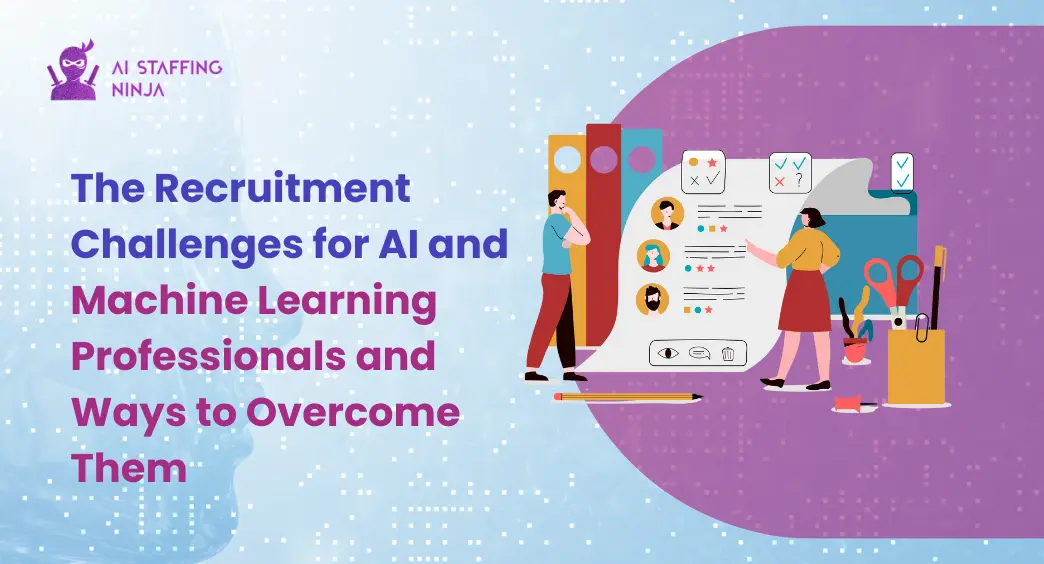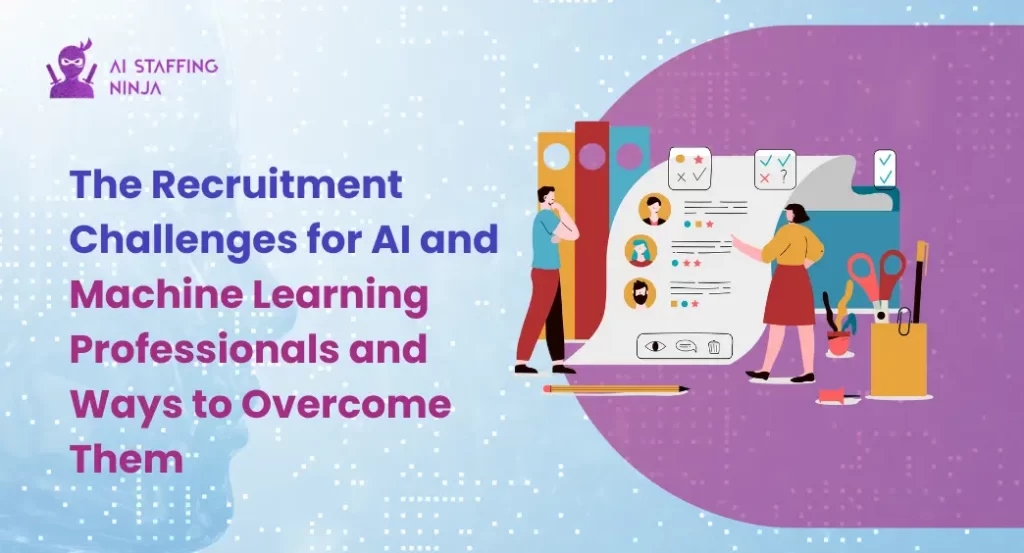
- By : By Staffing Ninja
The Challenges of Recruiting AI and Machine Learning Professionals and How to Overcome Them

We give you reasons why hiring for the AI and ML industry is a challenge and how to overcome the same!
After the release of ChatGPT in 2022, the benefits of AI and ML are evident across all industries. From taking the load of repetitive work off employees to analyzing data, AI has vastly impacted the workplace. While AI has made lives easy for many employees, it has also created many jobs in the workforce. However, AI and Machine learning recruitment comes with its fair share of challenges. These challenges include a shortage of AI and ML professors, gaps between real-world skills and the educational background of candidates in the ML and AI space, and more.
Key Challenges in Recruiting AI and ML Professionals
One of the reasons for difficulties in hiring ML professionals and AI candidates is the massive demand for them. As per a LinkedIn report, the annual growth rate for AI and ML professionals has been 74% in the U.S. in the last three years. This has created a gap in the supply and demand of such candidates. To elucidate further:
1. High Demand and Limited Talent Pool
Given the LinkedIn report, there is an evident gap between the job market and the talent pool due to the high demand for candidates. When it comes to hiring AI and ML professionals, finding the right candidate becomes difficult. This is because most professionals refrain from using social media platforms like LinkedIn, Xing, and Jobcase, making it harder for recruitment agencies or human resource departments to reach out to them.
2. Educational Expertise and Experience:
The educational system often presents a major challenge for recruiters to hire the right candidates. The artificial intelligence and machine learning industry often requires both educational qualifications and hands-on experience of a couple of years. However, traditional academic systems often fail to implement proper courses or stay up-to-date with new research findings that would be beneficial for job seekers.
3. Rapidly Evolving Skill Requirements
Considering the complex field of the AI and ML industry, a thorough knowledge of statistics, mathematics, and other domain-specific skills such as programming languages is often a necessity. To add, many times employers look for years of experience while hiring AI talent and ML talent. However, entry-level candidates in the domain do not often have the right experience or skill set. This makes many candidates unqualified for jobs as there lies a huge gap between theoretical and practical implementation of the AI and ML roles. This leads to drawn-out hiring practices or unfilled positions.
4. Difficulty in Assessing Technical Skills
There are enormous obstacles professionals face in the artificial intelligence and machine learning space who do not possess technical skills. HR professionals often have a hard time assessing candidates who do not have technical skills, which can lead to selecting underqualified candidates, causing a mismatch. Further, without technical knowledge of the AI and ML roles, HR professionals cannot gauge problem-solving skills, have difficulty evaluating ML expertise, or have difficulty assessing the technical skills of candidates. In addition, writing job descriptions for niche-specific roles can also become difficult.
5. Competition from Leading Tech Companies
High paychecks, enticing stock plans, and various privileges like flexible timing have lured top talents in the AI and ML space to join leading tech companies. To compete, smaller and mid-sized companies can draw good candidates by highlighting their USPs, showcasing the teamwork ethos and opportunities for growth in their careers. Further, fostering an inclusive workplace and competitive salaries can help smaller firms attract proficient candidates.
Strategies to Overcome Recruitment Challenges
To secure the top talent in the AI and ML industry, overcoming the challenges that come with it is a must. Overcoming AI and ML recruitment challenges can retain skilled professionals and help companies have a competitive advantage over other firms.
1. Expanding Talent Acquisition Channels
For AI and ML professionals to successfully address problems in recruiting, it is important to draw upon various means of bringing in new talent to an organization’s pool. Organizations need to move away from traditional job sites and applications and look forward to connecting with individuals on various other platforms. For instance, while LinkedIn job boards stand as a great talent hunt strategy, connecting with individuals in AI and ML groups, and getting in touch with AI recruitment platforms and talent acquisition channels on Slack, Discord, and Telegram often amplifies the success rate of finding a suitable candidate.
2. Investing in Training and Development
One of the key challenges in the AI and ML field is employee retention. In an already scarce talent pool, employees leaving organizations can severely affect the business. Also, as many candidates enter the workforce with theoretical knowledge, training and development can help professionals get the first-hand experience they require. Often companies invest in AI training programs and ML development initiatives to upskill professionals. This helps the company retain the employees.
3. Implementing Effective Assessment Tools
If a company does not hire the right candidate, it can cause both emotional and monetary losses which is why having the right assessment tools in place is important for HR managers. With the help of assessment tools, HR professionals can gauge the problem-solving abilities and experiences of candidates. These tools can also utilize various technical evaluation methods and create real-world simulations to gauge an employee’s expertise. Incorporating such tools in the recruitment process can help organizations match with the right talent.
4. Enhancing Employer Branding
Employer branding is a necessity in today’s day and age, as many employees tally employers while choosing their workplace. Companies can showcase their perks and benefits, lifestyles, and projects in a nutshell, attracting ML professionals and skilled workers in the AI industry. Sharing success stories, and leadership experiences, and highlighting an inclusive workplace often draws in talent who might be culturally fit with the organization.
Conclusion
Hiring AI and ML experts involves hurdles such as evaluating skills and vying for top-notch candidates in the field. One way to tackle this problem is by using various assessment tools among many others. Employer branding also is a key determinant in hiring AI and ML professionals. If you need help with any of these processes, our recruitment firm is here to help you every step of the way. To learn more about AI and ML recruiting processes, stay tuned!
